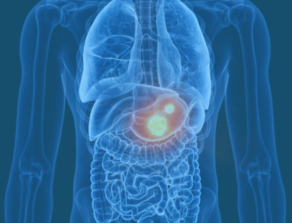Stomach and Esophageal Cancer
About Stomach and Esophageal Cancer
Stomach cancer (also known as gastric cancer) is cancer that starts in any part of the stomach. It is 1.5% of all cancers diagnosed in the U.S. but the fifth most commonly diagnosed cancer worldwide. Esophageal cancer is a cancer that develops in the esophagus, the tube that carries food from the mouth to the stomach. Esophageal cancer makes up about 1% of all cancers diagnosed in the US and is the eighth most frequently diagnosed cancer worldwide.
Stomach and Esophageal Cancer Key Facts
- An estimated 26,980 new cases of stomach cancer and 22,370 new cases of esophageal cancer will be diagnosed in the U.S. in 2024, with about 27,010 deaths expected to result from these diagnoses.
- The risk of developing either stomach or esophageal cancer increases with age. About 6 of every 10 people receiving a diagnosis are 65 years or older.
- In the U.S., the lifetime risk of developing stomach cancer is higher in men (about 1 in 101) than in women (about 1 in 155). For esophageal cancer, the risk is 1 in 127 men and about 1 in 434 women.
- The overall five-year relative survival rate in the U.S. for people with stomach cancer is about 36% and about 22% for esophageal cancer.
- Both stomach and esophageal cancers are more common in other parts of the world, particularly in less developed countries.
Sources: American Cancer Society’s (ACS) Cancer Facts & Figures 2024; American Cancer Society’s website 2023; WHO International Agency for Research on Cancer 2020

Prevention Tips for Stomach Cancer
- Avoid alcohol and tobacco
- A healthy diet and maintain a healthy body weight
- Stay active
- Treat H pylori infection
- Aspirin Use
- Be aware of family syndromes and get early testing
Resource: Preventing Stomach Cancer | Can Stomach Cancer Be Prevented? | American Cancer Society
Prevention Tips for Esophageal Cancer
- Avoid alcohol and tobacco
- A healthy diet and maintain a healthy body weight
- Stay active
- Get treated for reflux or Barrett’s esophagus
- Reflux – Surgery or Medicine: H2 blockers or proton pump inhibitors (PPIs)
- Barrett’s esophagus – PPIs, also may consider Aspirin, other non-steroidal anti-inflammatory drugs (NSAIDs), such as ibuprofen
Resource: Can Esophageal Cancer Be Prevented? | Preventing Esophagus Cancer | American Cancer Society
If you have any of the symptoms below, it does not mean you have cancer but you should see your doctor or health care professional so that the cause can be found and treated, if needed.
- Poor appetite
- Weight loss (without trying)
- Abdominal (belly) pain
- Vague discomfort in the abdomen, usually above the navel
- Feeling full after eating only a small meal
- Heartburn or indigestion
- Nausea, Vomiting – with or without blood
- Swelling or fluid build-up in the abdomen
- Blood in the stool
- Feeling tired or weak, as a result of having too few red blood cells (anemia)
- Yellowing of the skin and eyes (jaundice), if the cancer spreads to the liver
Source: American Cancer Society’s website 2024
Risk Factors of Stomach Cancer
- Sex – more common in men than in women
- Age – most are diagnosed in 60s, 70s, or 80s
- Race/Ethnicity – more common in Hispanic Americans, African Americans, Native Americans, Asian Americans, and Pacific Islanders
- Geography – more common in East Asia, Eastern Europe, and South and Central America
- Helicobacter pylori infection
- Obesity
- Diet
- Large amount of foods preserved by salting
- Regularly eating processed, grilled, or charcoaled meats
- Eat few or no fruits
- Alcohol and tobacco use
- Previous stomach surgery
- Some types of stomach polyps
- adenomatous polyps – also called adenomas
- Menetrier disease (hypertrophic gastropathy)
- Inherited cancer syndrome
- Hereditary diffuse gastric cancer (HDGC)
- Lynch syndrome (hereditary non-polyposis colorectal cancer, or HNPCC)
- Familial adenomatous polyposis (FAP)
- Gastric adenoma and proximal polyposis of the stomach (GAPPS)
- Li-Fraumeni syndrome
- Peutz-Jeghers syndrome (PJS)
- Family or personal history of stomach cancer
- Common variable immune deficiency (CVID)
- Epstein-Barr virus (EBV) infection
- Workplace exposure – coal, metal, and rubber
- Having type A blood
Resource: What Are the Risk Factors for Stomach Cancer? | American Cancer Society
Risk Factors of Esophageal Cancer
- Men are more likely to develop Esophageal cancer than women
- Age – chance of getting it increases with age
- Tobacco and alcohol use
- Gastroesophageal reflux disease
- Barrett’s esophagus
- Obesity
- Diet high in processed meats, low in fruits and vegetables, and drinking hot liquids at temperatures of 149° F or 65° C
- Achalasia
- Tylosis
- Plummer-Vinson Syndrome
- Injury to the esophagus
- Personal or family history of certain types of cancers
- Human papillomavirus (HPV) infection
Resource: Esophageal Cancer Risk Factors | Esophagus Cancer Risk | American Cancer Society
NFCR-Supported Researchers Working on Stomach and Esophageal Cancer
Wei Zhang, Ph.D.
Wake Forest Baptist Medical Center
Ronald A. DePinho, M.D.
University of Texas MD Anderson Cancer Center
Paul Schimmel, Ph.D.
Scripps Research
Xiang-Lei Yang, Ph.D.
Scripps Research















